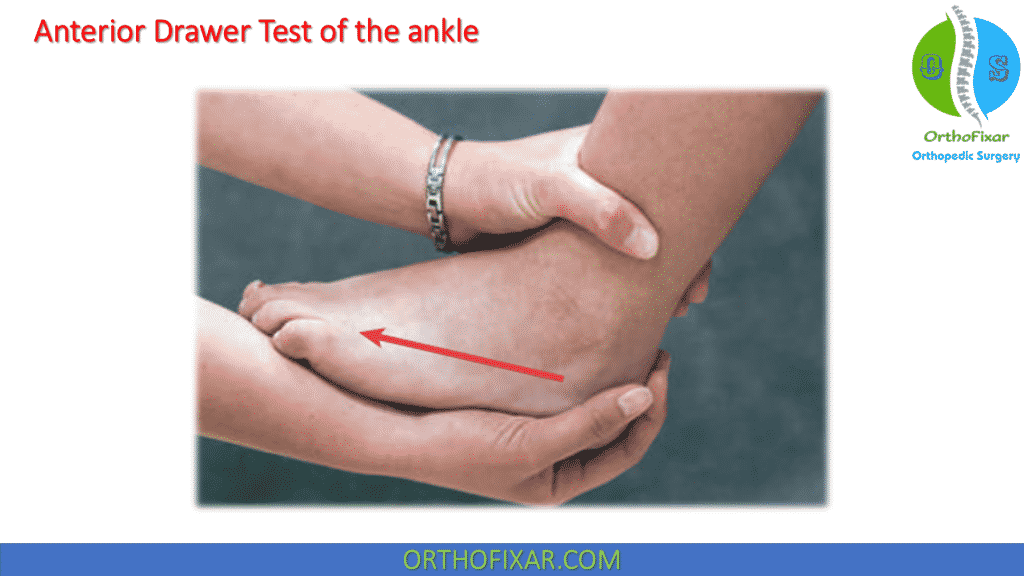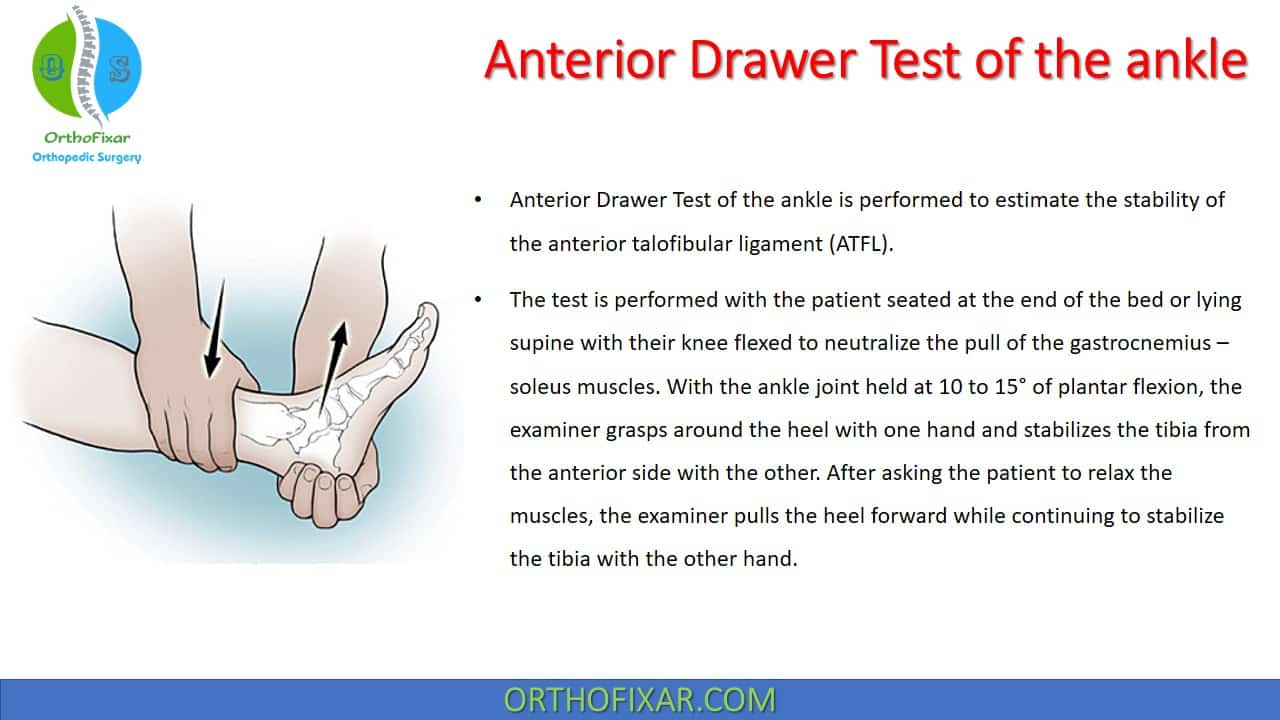Anterior Drawer Test Of Ankle
Anterior Drawer Test Of Ankle - The patient is in supine lying or sitting position with the knee in flexed position to relax the calf muscles and prevent the patient from resisting the examiner. Anterior talofibular ligament (atfl), calcaneofibular ligament (cfl), and posterior talofibular ligament. Web testing the lateral ankle after injury should include specific tests designed to examine the integrity of its structures. Web the highest specificity was attributed to the anterior drawer test, the anterolateral drawer test, the reverse anterior lateral drawer test, tenderness on palpation of the proximal fibular, and the squeeze test. Web april 15, 2024. Web the anterior drawer test can be used to assess the integrity of the anterior talofibular ligament 8 ( figure 2), and the inversion stress test can be used to assess the integrity of the. Most tears result from inversion. In particular, it helps prevent excessive forward (anterior) movement of the talus bone relative to the tibia and fibula. Web anterior drawer test of the ankle is performed to estimate the stability of the anterior talofibular ligament (atfl). Web upon assessment, he was ambulating with an antalgic gait over the right lower limb. Inversion (turning the foot inward) tears the lateral ligaments, usually beginning with the anterior talofibular ligament. The purpose of using special investigations and tests is to confirm the clinical diagnosis. Most tears result from inversion. The following tests are intended to assess injury to the lateral ankle ligament complex: Web the prone anterior drawer test of the ankle is an. Web upon assessment, he was ambulating with an antalgic gait over the right lower limb. The range of motion was limited, from 0 to 45 degrees of plantarflexion. The following tests are intended to assess injury to the lateral ankle ligament complex: The atfl is one of the primary stabilizing ligaments on the outer side of the ankle joint, and. Web the anterior drawer test is a set of knee and lower leg movements healthcare providers use to diagnose acl tears. Test competency by anterior drawer in 20° of plantar flexion and compare to uninjured side. Anterior drawer in 20° of plantar flexion. Web enroll in our online course: 47k views 4 years ago #orthoevalpal. In particular, it helps prevent excessive forward (anterior) movement of the talus bone relative to the tibia and fibula. Anterior drawer in 20° of plantar flexion. Web anterior and posterior talofibular (lateral ligaments) calcaneofibular (lateral ligaments—see figure ligaments of the ankle ) ligaments of the ankle. Web the anterior drawer test can be used to assess the integrity of the. Anterior talofibular, calcaneofibular and posterior talofibular ligaments. There was laxity on the anterior drawer test with the ankle in the plantarflexion position. Want to join the oep community? Web the anterior drawer test can be used to assess the integrity of the anterior talofibular ligament 8 ( figure 2), and the inversion stress test can be used to assess the. Inversion (turning the foot inward) tears the lateral ligaments, usually beginning with the anterior talofibular ligament. Web the anterior drawer test assess the integrity of the anterior talofibular ligament (atfl) in the ankle. Anterior talofibular ligament (atfl), calcaneofibular ligament (cfl), and posterior talofibular ligament. Want to join the oep community? There was laxity on the anterior drawer test with the. Web anterior and posterior talofibular (lateral ligaments) calcaneofibular (lateral ligaments—see figure ligaments of the ankle ) ligaments of the ankle. To test for ligamentous laxity or instability in the ankle. With the other hand, the examiner grasps the heel while the patient's foot rests on the anterior aspect of the examiner's arm. This test primarily assesses the strength of the. To determine the diagnostic accuracy of clinical tests assessing the talocrural and subtalar joint ligaments after ankle sprain. The atfl is one of the primary stabilizing ligaments on the outside of the ankle joint. Web the prone anterior drawer test of the ankle is an orthopaedic test used to assess the integrity of the lateral collateral ligaments of the ankle. Taking a patient's history and completing an objective assessment is the gold standard for the foot and ankle assessment. Anterior talofibular, calcaneofibular and posterior talofibular ligaments. To determine the diagnostic accuracy of clinical tests assessing the talocrural and subtalar joint ligaments after ankle sprain. Web anterior and posterior talofibular (lateral ligaments) calcaneofibular (lateral ligaments—see figure ligaments of the ankle ). This test primarily assesses the strength of the anterior talofibular ligament. The atfl is one of the primary stabilizing ligaments on the outside of the ankle joint. Web testing the lateral ankle after injury should include specific tests designed to examine the integrity of its structures. T to investigate the diagnostic accuracy of the ankle anterior drawer test (adt) to. With the other hand, the examiner grasps the heel while the patient's foot rests on the anterior aspect of the examiner's arm. Inversion (turning the foot inward) tears the lateral ligaments, usually beginning with the anterior talofibular ligament. Web the anterior drawer test can be used to assess the integrity of the anterior talofibular ligament 8 ( figure 2), and the inversion stress test can be used to assess the integrity of the. The purpose of using special investigations and tests is to confirm the clinical diagnosis. The following tests are intended to assess injury to the lateral ankle ligament complex: To determine the diagnostic accuracy of clinical tests assessing the talocrural and subtalar joint ligaments after ankle sprain. Anterior talofibular ligament (atfl), calcaneofibular ligament (cfl), and posterior talofibular ligament. T to investigate the diagnostic accuracy of the ankle anterior drawer test (adt) to detect anterior talocrural joint laxity in adults with a history of lateral ankle sprain. Web testing the lateral ankle after injury should include specific tests designed to examine the integrity of its structures. Ortho eval pal with paul marquis pt. Web the anterior drawer test of the ankle is a common orthopedic test to assess the passive stability of the lateral ankle joint after trauma. The atfl is one of the primary stabilizing ligaments on the outer side of the ankle joint, and it helps prevent excessive forward (anterior) movement of the talus bone relative to the tibia and fibula. How do you perform an anterior drawer test of the ankle? Want to join the oep community? The atfl is one of the primary stabilizing ligaments on the outside of the ankle joint. To test for ligamentous laxity or instability in the ankle.
Foot & Ankle Anterior Drawer Test (APPA) YouTube

Anterior Drawer Test Of The Ankle

Ankle Anterior Drawer Test YouTube

Anterior Drawer Test of the Ankle Chronic Ankle Laxity & Anterior

Anterior drawer test for the ankle YouTube

Anterior Drawer Test of the Ankle YouTube

Anterior Drawer Test of Ankle YouTube

Positive Anterior Drawer TestAnkle Exam YouTube

Anterior Drawer Test of the Ankle Inversion Trauma Lateral Ankle Sprain

Anterior Drawer Test Of The Ankle
The Range Of Motion Was Limited, From 0 To 45 Degrees Of Plantarflexion.
Test Competency By Anterior Drawer In 20° Of Plantar Flexion And Compare To Uninjured Side.
In Particular, It Helps Prevent Excessive Forward (Anterior) Movement Of The Talus Bone Relative To The Tibia And Fibula.
Web The Anterior Drawer Test Is A Set Of Knee And Lower Leg Movements Healthcare Providers Use To Diagnose Acl Tears.
Related Post: